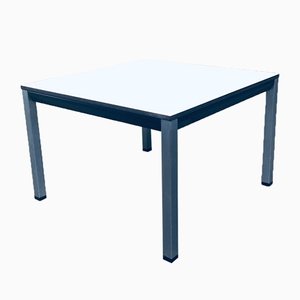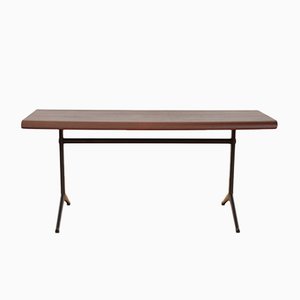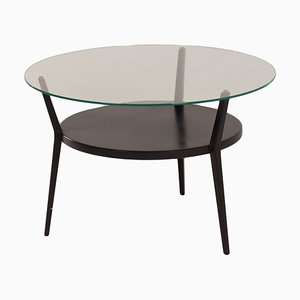
Innovative Dutch design icon Friso Kramer was an active member in many influential design associations and a driving force behind the development of the Dutch modernist aesthetic from the 1940s onward. Son of accomplished architect Piet Kramer (1881-1961), Friso Kramer was born in Amsterdam in 1922. He earned a degree in interior architecture from the Institute of Applied Art in Amsterdam under director and architect Mart Stam (1899-1986). After graduating, he sought positions to gain experience in the fields of architecture and industrial design, including work for Bureaus JP Kloos and Frans Paulussen. In 1948, Kramer began designing for the steel furniture manufacturer De Cirkel, a subsidiary of Ahrend, where he eventually became the Art Director (1971 to 1983).
During the 1950s, Kramer joined the Stichting Goed Wonen (Good Living Association), a design and industry partnership that was committed to postwar reconstruction and quality-of-life improvements through good design. The group forged many strong collaborations between artists, designers, architects, manufacturers, and customers, which resulted in widespread interest in modernist design principles and aesthetics in the Netherlands. Kramer, together with designers Wim Crouwel, Benno Wissing, and Paul and Dick Schwarz, founded the acclaimed Total Design Bureau in 1963. Their aim was to execute design ideas that would achieve “total design” or syntheses between the various design fields. This milieu had a profound influence on Kramer and inspired him to produce rational, minimalist furniture for the new age. Iconic designs from Kramer’s career include the Eames-inspired, steal and plywood Revolt Chair (1953), a true classic of midcentury Dutch industrial design and arguably Kramer’s most famous work; Straatlantaarn Streetlight (1960) for The Hague; Facet Table (1964); the ergonomic, modular MEHES office series (1972); AKD Chair (1973); and FKS Stackable Chair and Table (1998).
Throughout the course of his career, Kramer held many acclaimed positions, including member of the Amsterdam Art Council, the Dutch Industrial Design Council, and the International Design Consortium. Kramer’s designs have been exhibited in the Stedelijik Museum in Amsterdam and the Museum Boijmans Van Beuningen in Rotterdam. He is also the recipient of the title “Royal Designer for Industry” by the Royal Society of Arts in London.



